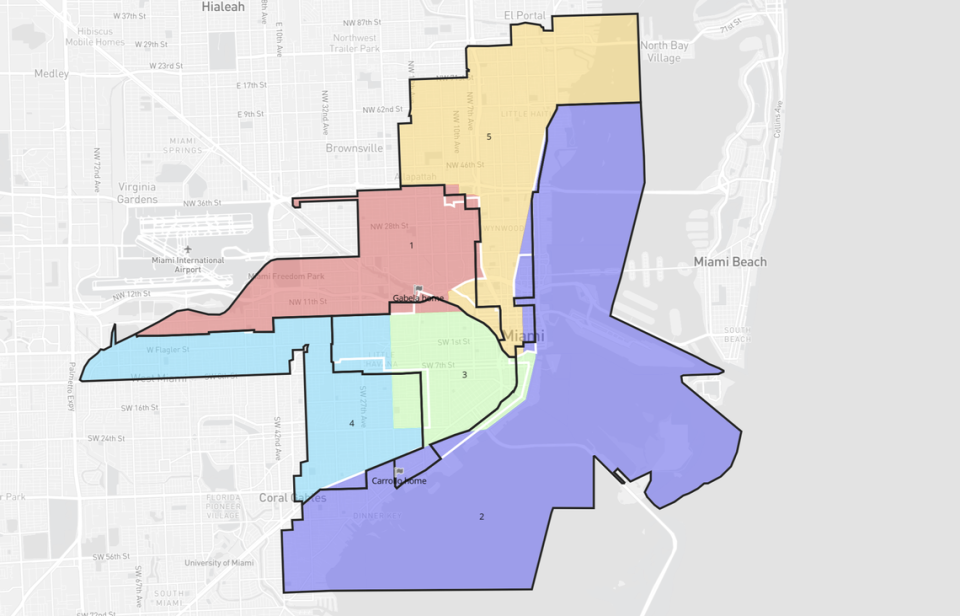Miami commissioners not ready to accept new voting map in gerrymandering settlement
- Oops!Something went wrong.Please try again later.
Miami commissioners are not yet ready to accept a new voting map as part of a settlement in a racial gerrymandering lawsuit, expressing concerns that the proposed map wouldn’t guarantee diversity of elected officials, adding further delay to contentious legal battle.
In a 4-0 vote, the Miami City Commission on Thursday deferred a vote on the settlement to the May 23 meeting, with some members saying it was too important of a decision to make without the presence of Commissioner Damian Pardo, who is out of the country for a previously planned engagement.
Reached by phone after the vote, Pardo said he was “disappointed” in the commission’s decision to defer. He pointed out that he was the commissioner who sponsored a resolution for the settlement in January.
“My position has been very clear,” Pardo said. “I would have certainly voted in favor of the settlement.”
Chairwoman Christine King took a similar position.
“I am ready to move forward with it,” she told her colleagues, adding that Thursday’s vote should have been simply a “procedural item” because commissioners had previously agreed on the terms in a shade meeting.

But Commissioners Manolo Reyes and Joe Carollo expressed hesitancy, saying they feared the proposed new map wouldn’t guarantee ethnic diversity on the commission.
“Our city should be equally represented, and that’s my big concern about this. … I’m concerned about the future of the city of Miami,” Reyes said.
The new map had been agreed upon by both sides as part of a proposed settlement in a federal lawsuit against the city filed by voting rights activists represented by the American Civil Liberties Union. The settlement required City Commission approval.
READ MORE: More Democrats here, more Republicans there: How Miami’s voting districts are changing
Last month, U.S. District Judge K. Michael Moore ruled in the case that Miami’s voting map was racially gerrymandered and ordered the city to toss it out. Before the ruling, commissioners had openly stated that the voting map was drawn to ensure the five-member commission comprised three Hispanic, one white and one Black commissioner to guarantee racial diversity of the board’s membership — a policy that Moore said violated the 14th Amendment of the U.S. Constitution.
A Miami Herald analysis of the proposed new map showed it would lead to only minor changes to the racial makeup of the city’s five voting districts, maintaining Hispanic supermajorities in Districts 1, 3 and 4, and a Black majority in District 5.
In a statement to the Herald, the ACLU said it was “disappointed in the postponement.”
“We hoped that after the ruling by the U.S. District Court the City would want to resolve this matter expeditiously and look forward towards the development of a new and racially equitable redistricting process,” said spokesman Howard Simon.
“Our clients fought for district lines that were fair to the communities that make-up our multi-racial, multi-ethnic and multi-cultural City,” Simon continued. “And we fought to improve democracy in Miami by requiring the use of district maps that are fair and not racially discriminatory.”
Carollo said Thursday that he wanted a chance to compare the map to two previously proposed versions that came about during the settlement talks. King countered that officials had already been provided with that information prior to the meeting.
The legal implications for deferring the settlement approval weren’t immediately clear. Attorney Christopher Johnson, outside counsel for the city, said the city is supposed to give the court a briefing on the status of the settlement discussion next week. He said the judge has paused the case for now but that it’s possible the judge will not continue the stay. The remedial process could involve the commission redrawing the map, Johnson said. At that point, the judge could accept or reject the city’s proposed map, or draw his own.
Under the current proposed settlement, the city would agree to pay the plaintiffs nearly $1.6 million in attorneys’ fees. Johnson said that figure was lower than the approximately $2 million the ACLU had originally requested.
The proposed settlement also stipulated that the city would not need to hold a special election for the incumbent commissioners as a result of the redrawn map. However, Johnson said it’s possible for that to change because commissioners delayed the settlement approval.
Carollo said he believed the city had “an excellent chance of overturning this in an appeal.” Johnson said that, if the city takes that route, it would need to file an appeal by tomorrow.

